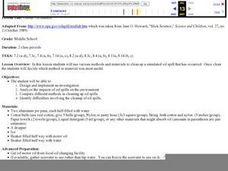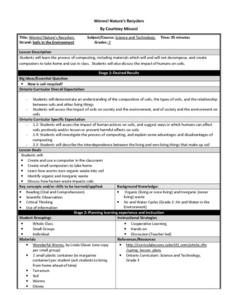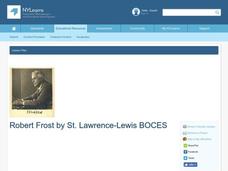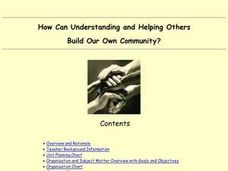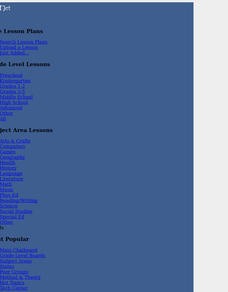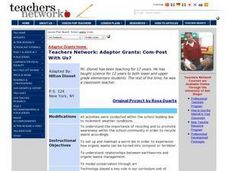Curated OER
Our Space Station Earth
Learners discover ways to preserve the Earth's resources. In this natural resources activity, students investigate how many gallons of water the average American uses per day and then total their estimated usage. Learners discuss the...
Curated OER
Earth Bags
Learners discuss the environment and the problems facing our natural resources. They write ways to help the environment on paper grocery bags, illustrate them, and distribute them to grocery stores to be used with customers.
Curated OER
Endangered Animals: Hawaii
Pupils locate regions in Hawaii where specific endangered animals live. They describe habitats, identify reasons why the species has become endangered, consider how a healthy environment for wildlife contributes to a healthy environment...
Curated OER
Air, Air Everywhere! Lesson 2: Acid Rain
Middle school environmentalists record the pH of four different liquids, including two aerosol cleaning products. They liken the products to acid rain and speculate in writing which might affect the human respiratory system. Although...
Curated OER
Global Oil Busters!
Students design and implement an investigation of the impact of oil spills on the environment. They then identify and compare different methods in cleaning up oil spills. Students write letters to the Governor about why the material they...
Curated OER
Worms, Nature's Recyclers!
Students study what worms need to survive in different environments. They study how worm composting improves soil and reduce waste. They discuss composting techniques and present a puppet show about a worm's life.
Curated OER
Marine Debris
Now is the time to educate tomorrow's citizens to care for the planet, and here is a activity to help facilitate the process. Collect some marine debris and bring it into class. Have your class separate it into types and then test each...
Curated OER
Splish Splash
Students study drinking water. In this environment lesson, students draw the path of drinking water from the place of precipitation to the tap after researching a map and information from the United States Geological Survey water...
Curated OER
The Metamorphosis by Franz Kafka
Students, after reading and discussing, "The Metamorphosis," by Franz Kafka, explain the symbolism of Gregor's metamorphosis moving beyond a literal view of "he turned into a bug" into the idea that society/family/stress/environment led...
Curated OER
ESTIMATING LOCAL SEA LEVEL
Students observe the local environment based upon the sea level variations and examine many clues which can indicate sea level change.
Curated OER
Some Days Are Like That!
Second graders engage in an activity of reading a story and have a discussion about the story to measure comprehension. The use of a graphic organizer helps student retention because it is brain compatible for students.
Curated OER
Robert Frost
Start your poetry unit with this basic overview of Robert Frost's life and works. A PowerPoint presentation starts off the lesson, which ends in a short recall quiz about Robert Frost. The presentation would be sufficient for your lesson...
Denver Art Museum
The Poetry in Non-Events
The photograph, Nellie and her Italian Soda is viewed and discussed by the class. They are instructed to use the photograph as inspiration to write a poem about non-events, or things that are beautiful in every day life. Pupils use...
Curated OER
How Can Understanding and Helping Others Build Our Own Community?
Students examine the different cultures and disabilities people face in their community. They discuss how they can become better citizens. They answer discussion questions to finish the activity.
Curated OER
Industry and the Environment
Learners study industrial processes and greenhouse emissions. In this research lesson students choose a manufactured product, research the life cycle of the product, and present it in a PowerPoint presentation.
Curated OER
Ladybugs
Learners read The Grouchy Ladybug by Eric Carle, and explore the life cycle of ladybugs and how they interact with our environment.
Curated OER
Developing Environmental Awareness Through Problem Solving
Students examine the relationships among living and non-living parts of the environment. Using their senses, they identify the objects in their classroom. In groups, they participate in experiments to discover where electricity comes...
Curated OER
Pollution
First graders identify and discuss different kinds and sources of of pollution. They explain why it is important to keep the environment free of pollution. They make a poster depicting the dangers of pollution and make litter boxes.
Curated OER
Organic and Inorganic Recycling
Students examine their role in polluting the environment and discuss the importance of recycling. In groups, they place earthworms into compost piles to observe why they are considered natural recyclers. They also practice sorting a...
Curated OER
A Wild Chain Reaction
Students explore habitats. In this habitat lesson, students break into groups and are labeled as a part of a habitat. Students then do an activity with yarn that shows how all of the parts are connected and depend on each...
Curated OER
Water Cycle (Grades 2-4)
Students demonstrate their understanding of the water cycle and how it effects the environment by graphically depicting and describing the water cycle.
Curated OER
Models as Tools for Ecosystem Management
Fifth graders explore the concept of environmental management. In this ecosystem lesson plan, 5th graders discover how models help scientists learn more about managing ecosystems. Students create their own model, make observations...
Curated OER
Com-Post With Us? Learn About Recycling While Having Fun
Students examine the importance of recycling to help the environment. In groups, they make a compost bin on the school grounds recording how the material changes from week to week. They collect other materials for recycling like cell...
Curated OER
Com-Post With Us?
Students discuss the importance of reducing, recycling and reusing materials to help the environment. As a class, they create a worm bin and observe how it turns material in to compost. They use the internet to research the...






